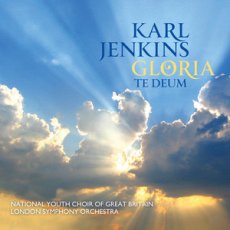
image © EMI Classics 2010
More Karl Jenkins:
Stella Natalis (2009)
Stabat Mater (2008)
Kiri Sings Karl (2006)
Tlep (2006)
with Adiemus:
Vocalise (2003) (SK)
Vocalise (2003) (PVV)
Adiemus Live (2001)
Adiemus Concert Review - Cardiff (2001)
The Eternal Knot (2000) (feature)
Adiemus Website
|
|
(15 October 2010) As the title suggests, the latest album release of Karl Jenkins, Gloria/Te Deum (EMI Classics (UK) 5099964643021, 2010) consists of two choral-orchestral works. These are the newly premiered Gloria and an earlier work of Karl, Te Deum. Te Deum was commissioned by the Liverpool Welsh Choral, and later the premiere concert was coined with the celebrations of "City Of Culture" status in Liverpool, receiving its premiere in November 30, 2008. Gloria, on the other hand, was commissioned by The Really Big Chorus (TRBC), a project led by Don Monro and ex-King Singer Brian Kay. The main goal of TRBC is to perform music from scratch. Everybody who would like to join them are welcome to sing on any ongoing project they have. TRBC has performed some of Karl Jenkins' music in the past as some years ago they learned and performed his highly successful works The Armed Man and Requiem, but this time they commissioned a completely new piece from him. The premiere concert of Gloria took place at London's Royal Albert Hall in July 11, 2010, under the baton of Brian Kay and in presence of the composer Karl Jenkins himself. Singing on stage there were about 2,500 singers from about sixteen different countries, though instead of the New Zealand-born soprano soloist Hayley Westenra, featured on the album version of this work, was unavailable for the premiere, the concert featured the voice of tenor Samuel Evans. On the album version, both the choirs and the orchestra are different from the premiere concert. On the album TRBC is replaced by The National Youth Choir Of Great Britain and instead of the English Festival Orchestra who did the live performance, the album version features the London Symphony Orchestra. Although the studio version of the album was released the day after the concert, the Abbey Road Live crew actually recorded the premiere concert "on the go," and the live version was then quickly pressed and sold to concert audience and the choir and orchestra members as an exclusive and rare memento. Like Karl's earlier and highly successful choral-orchestral works such as The Armed Man, Requiem and Stabat Mater, his new setting of Gloria is also a multi-denominational composition with readings from various sources such as Taoism, Buddhism and Hinduism side-to-side with Christian texts. The readings, which all share the idea of describing the "Most Divine," are interspersed with the musical movements of the work so that it could be performed either with or without the non-Christian contents. Although some may indeed find those readings interruptive, they are a vital and natural part of the composition as a whole. Both Gloria and Te Deum are a very interesting mixture of typical Karl Jenkins rhythms and melodies, and although the most avid fans easily spot that Jenkins is once again quoting himself in two of the movements in his Gloria by introducing the melody from one of the movements of Dewi Sant (2000)that fits like a glove within this work as well. The readings and the "attacca" tie-ins of some movements, especially in Te Deum, can be a bit nuisance if one listens to the the album on a random or shuffle setting. Because both Gloria and Te Deum are two very cohesive works, it is not very fair to point out any particular movements that could be better than others, but there are some real aural bliss moments in both works. The second and fourth sung movements of Gloria, "Laudamus Te" and "I'll Make Music" respectively, just will melt any listener's heart with their wonderful melodies, and the crystal clear voice of Hayley Westenra on the latter movement is the icing of the cake. Te Deum then, on the other hand, creates some very exciting musical contrasts between its movements, so it is a bit more challenging, not only for the performers but also for the listeners. Karl has very cleverly sandwiched some exciting rhythms between two very melodic and singable movements of Te Deum,, but still the contrast between "Te Ergo Quaesumus", the jolly "Aeterna Fac" and another mellow movement "Miserere Nostri" is never banal in any way. All in all, both Gloria and Te Deum are highly approachable works, both in the point of view of performers and the listeners, albeit Te Deum might be a little bit more challenging. And, this is what modern choral-orchestral music should be, accessible enough to please both the performers and the audience. These days, there are many compositions that are way too complex to understand and to get into thoroughly, which very easily means that the works are never performed again after their premiere. Gloria and Te Deum are works that both professional and amateur choirs and orchestras will put in their repertoire across the world, just like they have done with Karl's earlier successful settings of The Armed Man, Requiem and Stabat Mater, which all are also multi-denominational. In the meantime while waiting for new interpretations of Karl Jenkins' latest works Gloria  and Te Deum, let us enjoy the stunning new album from the master of melodies and rhythm!--Suvi Kaikkonen in Oulu, Finland and Russ Elliot in New York and Te Deum, let us enjoy the stunning new album from the master of melodies and rhythm!--Suvi Kaikkonen in Oulu, Finland and Russ Elliot in New York 
|






